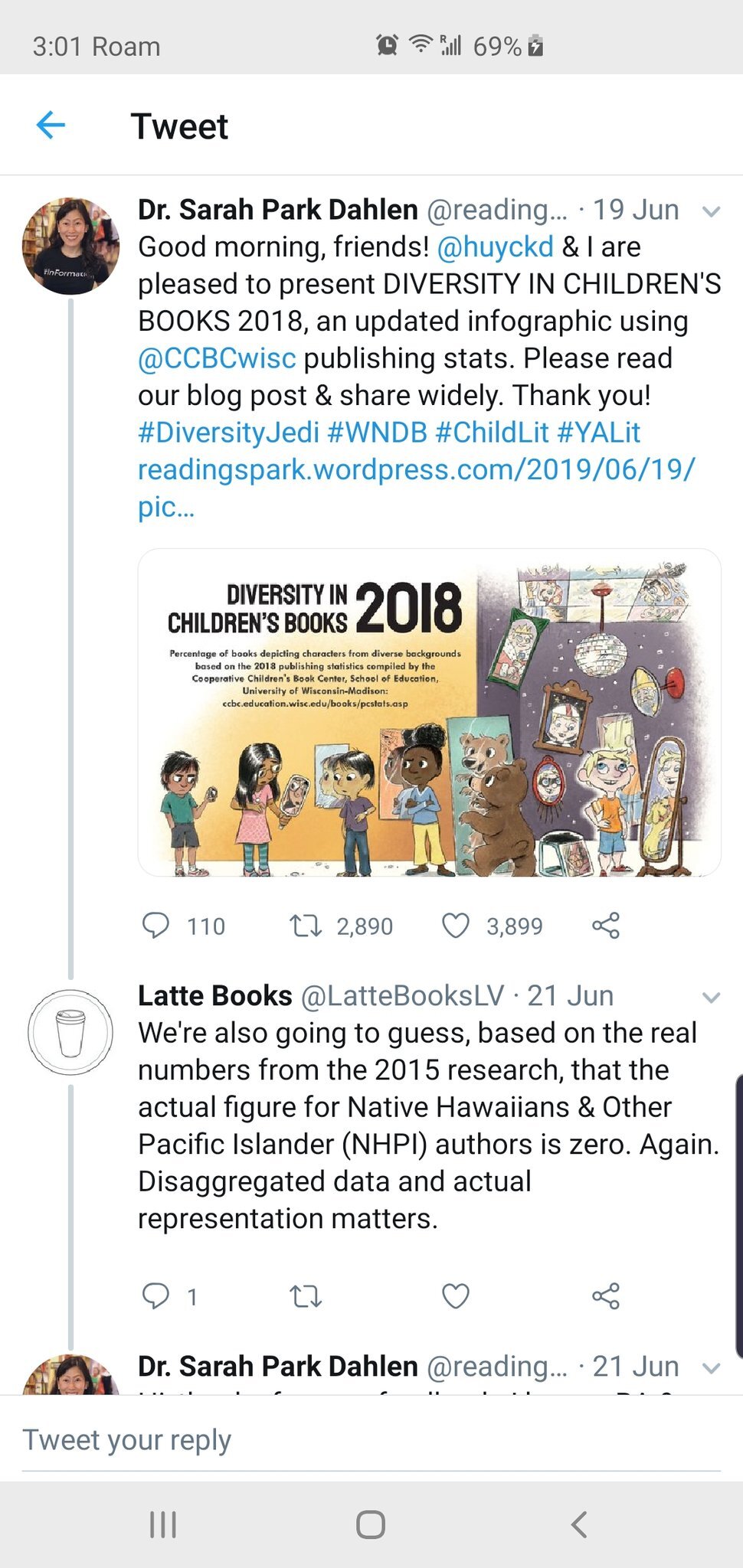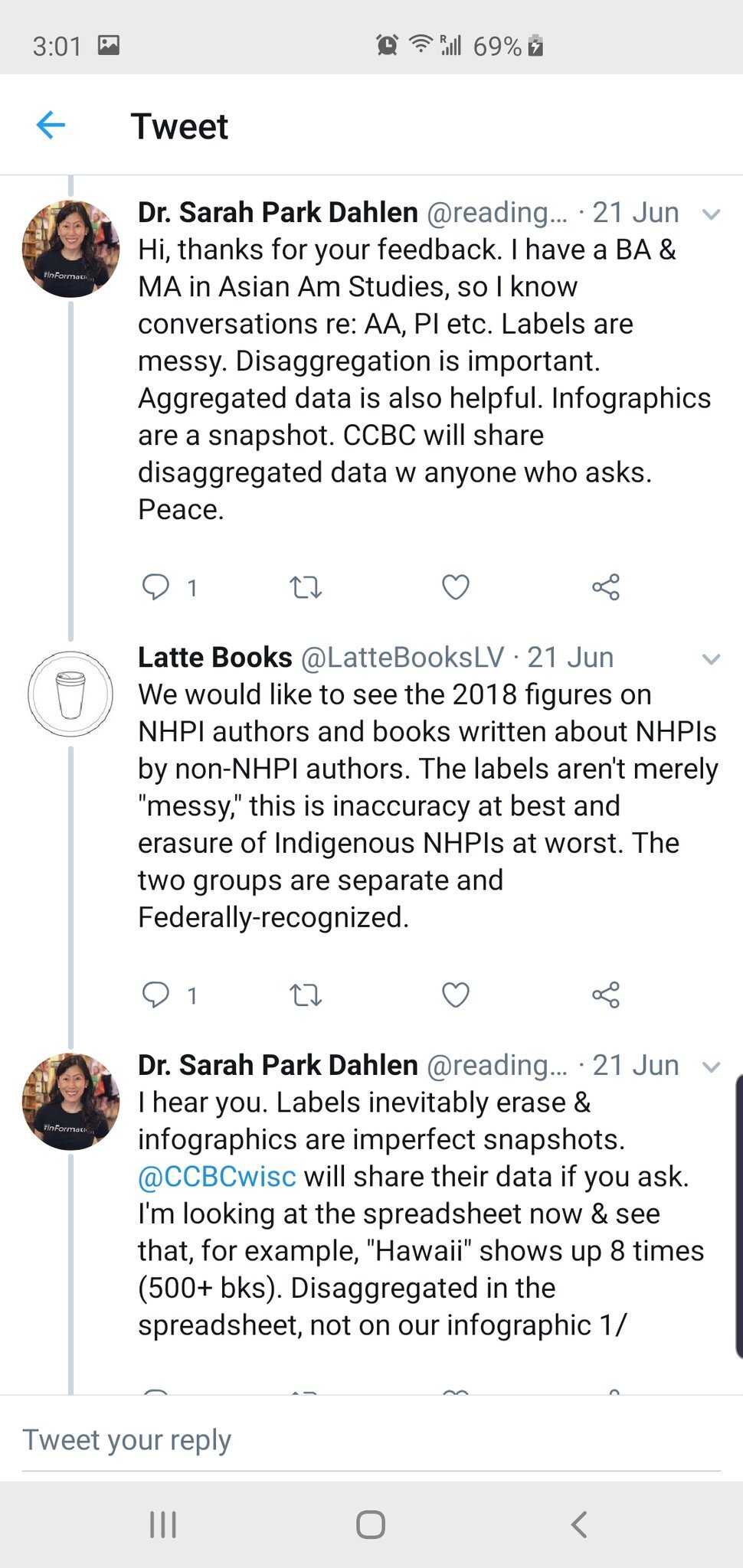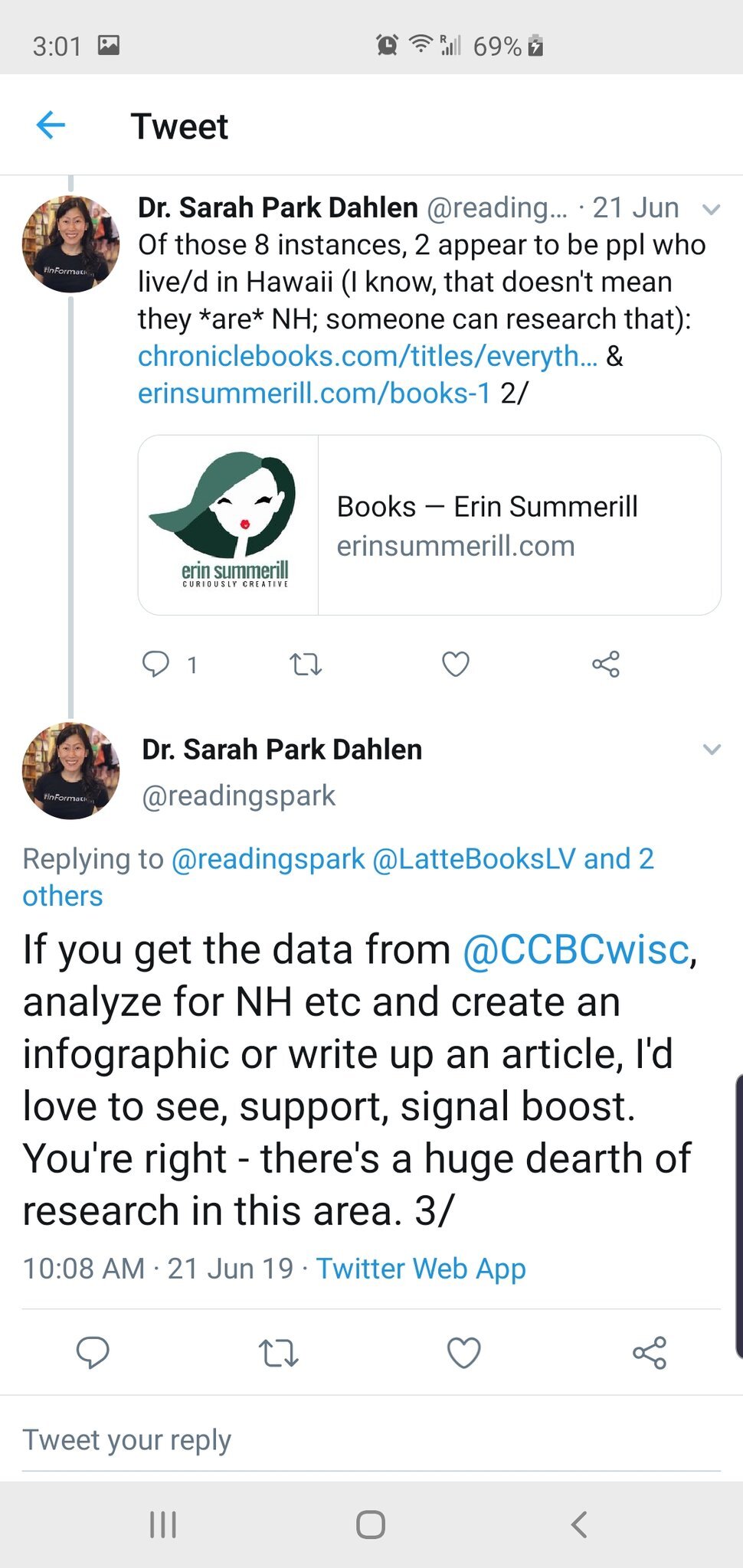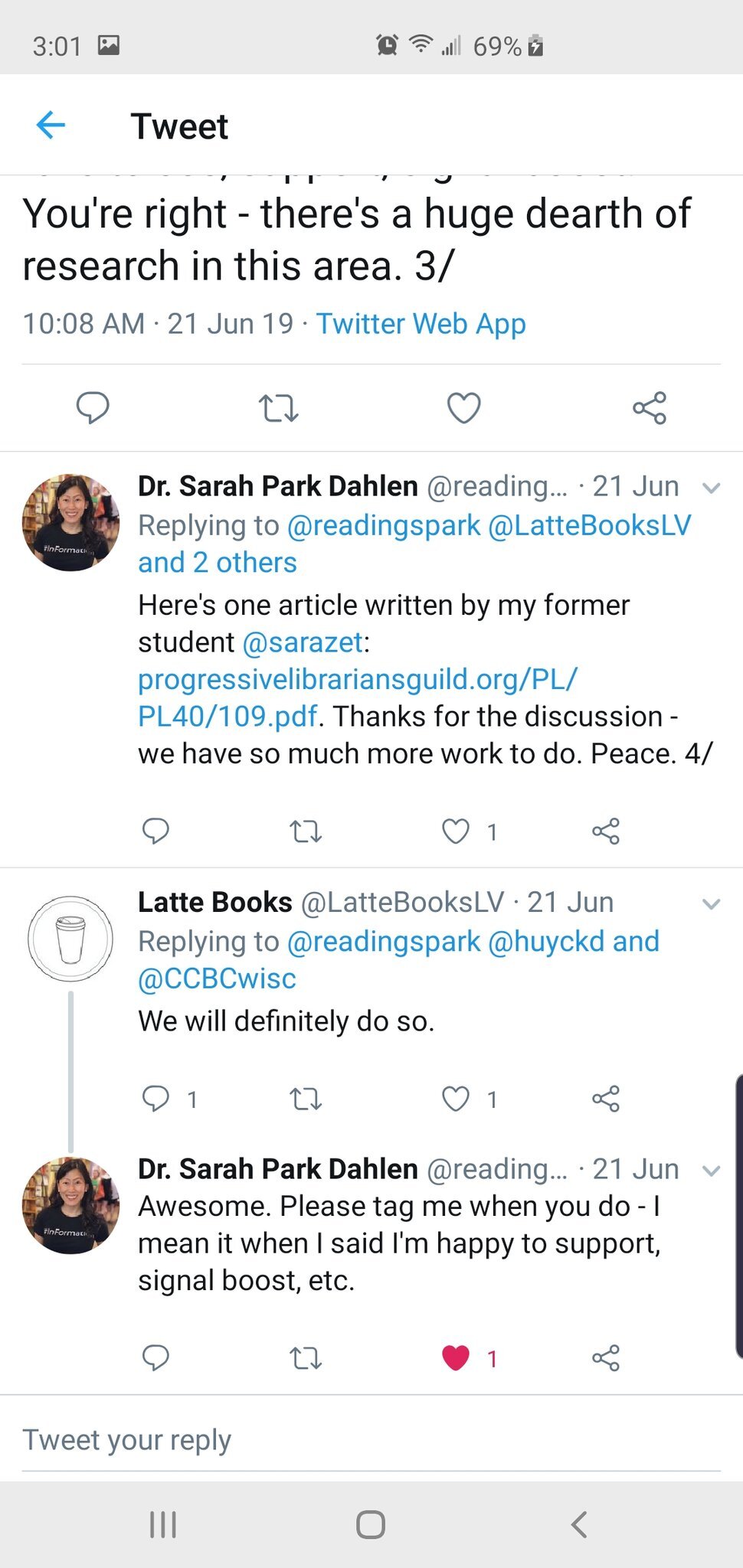Drowning
Indigenous Pacific Islander voices are still absent from mainstream literature.
The publishing industry in the United States has not been welcoming to Pacific Islander (NHPI) authors. It’s time to change that.
#OwnVoices and #WeNeedDiverseBooks categorizes literature to highlight ethnic and multicultural representation, but I noticed an important detail that often gets overlooked in data collection: Native Hawaiians and Other Pacific Islanders (NHPI) were excluded.
This was the original infographic that threw Asian Americans and "Pacifics" (I circled it in black) into the same category. #PacificIslanders exist, folks. And you can't just erase us.
Because being Pacific Islander also means having to fix someone else's shitty infographic.
At first glance in the infographic above, I noticed the erroneous lumping of “Asian” and “Pacific Islander” into “Asian Pacific Americans,” but after doing a bit more research to see if NHPI authors made it into #WeNeedDiverseBooks-promoted list, I found that there weren’t any.
We were left out of literary diversity research and NO ONE NOTICED. If I didn’t speak up, I doubted anyone else would – not even Asian authors who don’t seem to mind or even know that we’re MIA. After contacting #WeNeedDiverseBooks the issue still hasn’t been rectified.
As someone who’s dealt with literary agents and publishers telling me my stories as a bi Chamorro (Micronesian) woman and combat veteran were “unrelatable” and literary success couldn’t be measured since there allegedly aren’t other authors like me, I’ve often wondered: who profits from muting NHPI voices?
The answer to this is far more insidious.
Colonialism not only came from Western Europe and the United States, but East Asia as well. NHPI (Melanesian, Polynesian, and Micronesian) communities are fighting a painful uphill battle against a multilateral settler colonialism for not only our dying languages and seafaring cultural traditions that go back thousands of years, but to be heard in literature, film, art, and music without being tokenized or watching what little we have left appropriated by other groups.
There’s more to this story. Not only are we regularly gaslit out of literary representation, traditional publishing, and literary awards, but we have a vast ocean of socioeconomic issues. NHPIs migration toward 20,000 to 30,000 islands in the Pacific Ocean is estimated to have started around 5,000 BCE and includes 1000 dialects of diverse languages. However, unless you’re NHPI, this is probably the first time you’ve heard of us. Imagine, if you will, how lonely it must feel to walk through this world explaining to every new person you meet that you exist, not experiencing representation anywhere else in the world, and people cosplaying your culture as though you’re dead.
Personally, I have long felt like I’ve transitioned from being the Invisible Girl/Rand McNally as a child to Google Dracula as an adult. I have to explain world geography, history, and NHPI existence while not knowing what my reflection looks like in media – and it’s made me feel like a monster. Loneliness, despair, longing, and isolation is everywhere in literature, but the smallest ethnic group (.5 percent of the US population) isn’t exactly welcome to talk about it.
NHPIs are often left out of studies on poverty, social justice, education, military enlistment, healthcare outcomes, and incarceration. Spoiler alert: We’re grossly underrepresented in justice, higher education, media, history, and more, yet we’re conveniently overrepresented in the military (especially combat arms), incarceration, poverty, Type II Diabetes, COVID-19 deaths, and other preventable diseases. In the middle of a global climate change crisis, NHPIs represent a “canary in the coal mine.”
Our islands are disappearing due to rising sea levels, and we’re losing ancestral land and historical artifacts in a way that is painfully irreversible. We may be a small population compared to the rest of the US and global population, but our song is about saving humanity from itself. What we have to say on universal struggles as well as climate change and human rights is needed now. Not just for the sake of literary diversity and inclusion, but for a wake-up call the rest of the world needs to hear. When we’re erroneously lumped together with Asians, we’re denied our identity, dignity, voice, and the truth about our pain.
When it comes to being seen during US-based cultural heritage months, we’re denied space to breathe again. I can’t count how many times I’ve pushed myself to attend an API heritage month event only to be furious to find Asian-Americans using trivialized Hawaiian luau kitsch and LARPing Indigenous Pacific identity as though it’s some courageous act of solidarity.
Literary awards and publishers claiming to represent NHPIs? Forget it. It’s just as bad as #APIHeritageMonth. “API” literary awards are typically Asian-exclusive, leaving Pacific Islanders out in obscurity and allowing our voices to be appropriated by exponentially larger groups.
Kaya Press out of University of Southern California is a key culprit in this, and while it claims to be the voice for the “Asian Pacific Diaspora,” they only have one NHPI author out of its list of forty-eight authors. The other alternative? University of Hawaii Press for years also had an Asian-American woman at the gates of NHPI literature, and prevented Indigenous authors from being published. I would know, because I was one of them alongside other Micronesian authors who were denied a voice by both Kaya Press and University of Hawaii Press.
Literary agents? Also, seemingly a lost cause for NHPI authors. My experiences with predominantly European settler-American literary agencies were disheartening enough, but other POC literary agents (including Asian-American agents) consistently claimed they didn’t know how to represent me, saying they didn’t understand my culture and how to effectively promote me as an “unknown” minority. Over and over, I heard “unrelatable” hurled at me via phone and email by a notoriously whitewashed industry. Let me say this as loud as I can for those in the back: RESPRESENTATION MATTERS.
In film and other visual media, we’re starting to see a shift in diversity thanks to films like Black Panther and Crazy Rich Asians. They sure made a lot of money didn’t they? Now Hollywood is starting to perform a bit of introspection for the sake of capital. Today, we have a Hawaiian Aquaman and that feels like progress, but our list of NHPI actors, musicians, and entertainers is short. We have Dwayne Johnson, Jason Momoa, Roman Reigns, Keanu Reeves (don’t get me started on Point Break featuring a group of white folks teaching the one Hawaiian on set how to surf), and a few musicians like Nicole Scherzinger and Pia Mia.
What’s funniest to me, in being “unrelatable” in the literary world is that no one seems to have a problem with embracing NHPI men who come from Matriarchal cultures. NHPI women, on the other hand, are still mostly reduced as hypersexualized “exotic” extras or dashboard hula doll-esque. Along with Native American sports mascots, we're merely ornaments for tourists' imaginations. Lifeless, objectified, and preferably voiceless.
In a study that was intended to highlight marginalization and inclusivity in publishing, NHPI authors were erased not only by being thrown into a different ethnicity, but were dismissed all together as Indigenous peoples who are currently being exploited and colonized by not only the United States, but other regional superpowers in Asia.
Instead of including our voices in a tapestry of stories that comprise the universal human experience, we’re further marginalized, muted, and dismissed by an industry that perpetuates cultural fetishism at best and systemic, imperial oppression at worst.
Culture should connect us, allow us to see that the spectrum of pain and joy we feel is, in fact, universal. When we’re excluded from connecting with others through our #OwnVoices, the results are devastating. It only reminds us that the boots of colonialism are still firmly planted on our necks and we’re too invisibilized and underrepresented for anyone to notice or care.
You can’t #DecolonizeLit without allowing the most marginalized voices in literature to speak for themselves. If publishing and literary agencies don’t amend their current practices, this push for “diverse literature” is nothing more than PR, and another nail in the coffin for marginalized voices everywhere.
NHPI authors are STILL at 0% #ownvoices today in children’s literature.











